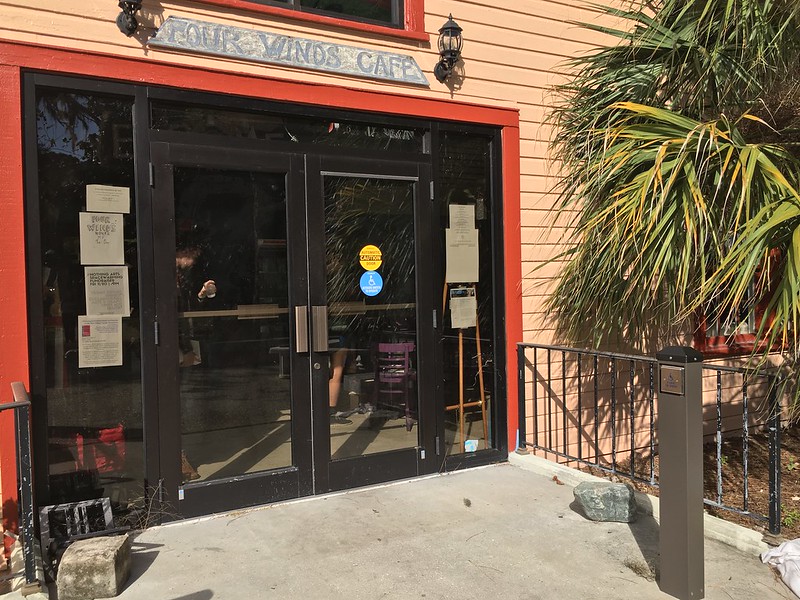
The Americans with Disabilities Act was signed into law in 1990. It included a provision that those with disabilities have the right to public access to accommodations, a demand which went into effect for all new construction beginning in 1992. But at New College, most of the buildings on campus were constructed decades before the 1992 deadline and several of them are considered historic properties, which have significantly less stringent requirements.
As a result, very little of the school’s campus meet any ADA requirements. Doors are too narrow, ramps are located in inconvenient locations or are completely absent, and mental health accommodations can be a struggle to be granted, and then followed up on. But this semester, with the work of thesis student and Vice President of Diversity and Inclusion Raina Nelson, the Disability Services Coordinator Meighan Hopton, and Physical Plant heads Alan Burr and Alan Dawson, the campus is, bit by bit, coming up to code.
The first big change took place in the Spring, with the CWC and Housing announcing increased accommodations for students with emotional service animals (ESA) as well as allowing dogs to qualify as ESAs. This change has already changed the campus landscape—a new dog park was installed beside Goldstein dorm to accommodate the new canines, all of whom live on the first floors of Dort and Goldstein.
But the physical construction needed to meet ADA standards are slightly harder to achieve.
Nelson has been leading the charge in addressing the work that needs to be done on campus. “Something I consider a priority is making sure that people with disabilities can easily enter any space on campus,” Nelson said. “That seems really basic, but it’s necessary to lay that out, because it hasn’t been done.”
One of the most recent victories has been with the Four Winds café. Nelson worked with Physical Plant to prioritize the construction of a ramp to accommodate the single step leading to the front entrance of Four Winds from Dort promenade. Previously, a student who needed ramp access to the Four Winds would have to travel around through the parking lot next to the Social Sciences office, an inconveniently long detour.
And the installation of an automatic door opening button has completed the construction to the entrance of Four Winds, as well as kick-started a project to begin installing automatic door openers across campus. “So far, only the one for Four Winds has been installed. But there are about five automatic door openers coming to ACE.”
The library installed a button for the front entrance during summer, but Nelson noticed with frustration that buttons that were previously located in the bathrooms inside the library had been removed, leaving only one ADA-accessible bathroom on the first floor and none on the second floor.
“My next major goal is to tackle issues on the residential side of campus,” Nelson said, citing the notorious slick tiles located across the Pei campus as a particular problem. Nelson also wants automatic door opening buttons installed in the dorms currently labeled handicap accessible, and making sure all ADA-labeled rooms are up to code.
Some projects, like College Hall, are much more complicated to navigate. “College Hall is a kind of a pain in my butt,” Nelson said. “Because College Hall is a ridiculous pink marble mansion, it would cost upwards of a quarter million dollars to install an elevator.”
“Unfortunately,” Nelson noted, “College Hall is grandfathered into the school as a kind of historic building, so fixing it is not required. Because of this, it just isn’t a top priority to the school.” And with a heavy price to make just one of the multiple changes College Hall needs to be ADA-accessible, it seems unlikely that any changes will come to the mansion anytime soon.
Not all ADA construction will be quite as expensive—the installation of seven automatic door opening buttons, including the button at the Four Winds, five in ACE and one in the Pei courts costs a comparatively measly $26,000. And ramps too are often a fairly easy installation, so construction will continue throughout the year.
Nelson will be hiring an Accessibilities representative for the NCSA by the end of the semester to serve as a liaison between the student body and Hopton in order to better identify the needs of disabled students on campus, and the Council for Diversity and Inclusion (CDI), headed by Nelson, will be hosting events throughout the year raising awareness for various disabilities. In October the CDI held an event to bring attention to invisible disabilities.
The road to an ADA-accessible campus is a long and winding one. But the task of addressing the problems on campus, once only lamented about, has finally been kicked in gear.
